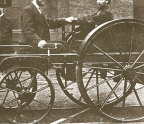
To anyone interested in the history of the London & North Eastern Railway and its celebrated Chief Mechanical Engineer, Nigel Gresley, the name of Bert Spencer will be familiar. This softly spoken, modest but very talented engineer laboured in the giant shadow cast by his leader, unobtrusively working to support him in his great endeavours.
Bert Spencer was a daily presence in the CME’s London offices at King’s Cross for sixteen years, having spent seven years learning his trade as a draughtsman and designer with the Great Northern Railway. However, such was his understanding of engineering and his leader’s way of working that he managed to merge into the background and never sought to steal the limelight from Gresley or embarrass him when his ideas went awry. He quietly went about his business suggesting improvements, translating often very sketchy proposals to ensure that any schemes reaching the Chief Draughtsman were effectively and correctly defined. He did this all with a master’s touch.
In some ways he may be seen as a ‘the power behind the throne’, but to do so would be disingenuous and wholly misleading of the man and his motives. He was, first and foremost, someone always prepared to work for the greater good, rejecting any thoughts of personal reward beyond the desire to see a job well done. In any walk of life such people are to be valued very highly.
Yet his time with Gresley occupied less than half his working life. Although a period in which they both reached the peaks of their careers, the remaining years were hardly wasted, each filled with many noteworthy achievements. First he served Gresley’s successor, Edward Thompson, and met the demands of war and recovery with equal skill and devotion. Then he ably supported the LNER’s last Chief Mechanical Engineer, Arthur Peppercorn, as he grappled with the after-effects of war and the machinations of nationalisation. Finally, there came ten years of active service with the newly formed British Railways, a time in which he played an important role in its test and evaluation programmes, the development of standardised steam locomotives and the introduction of diesels. But wherever he went or whatever he did, the guiding principles were those he forged whilst working at King’s Cross.
Without Gresley, Spencer might not have achieved so much, but I believe Gresley’s accomplishments could have been far less without the ever-present Spencer. Difficult to prove, of course, but it would be too easy to sweep the younger man’s contribution to one side by using the convenient but misleading epithet ‘they were Gresley’s engines’.
Unlike Gresley, Thompson and Peppercorn, Spencer did not have the benefit of a public school education. From a poor, under-privileged background he found an outlet for his undoubted intelligence through education and took full advantage of what was on offer in Doncaster. He later described his early years when he wrote:
“I was born in a typical Victorian terraced house close to Doncaster town centre. My father [Abel] was a cabinet maker and my mother [Frances] his third




